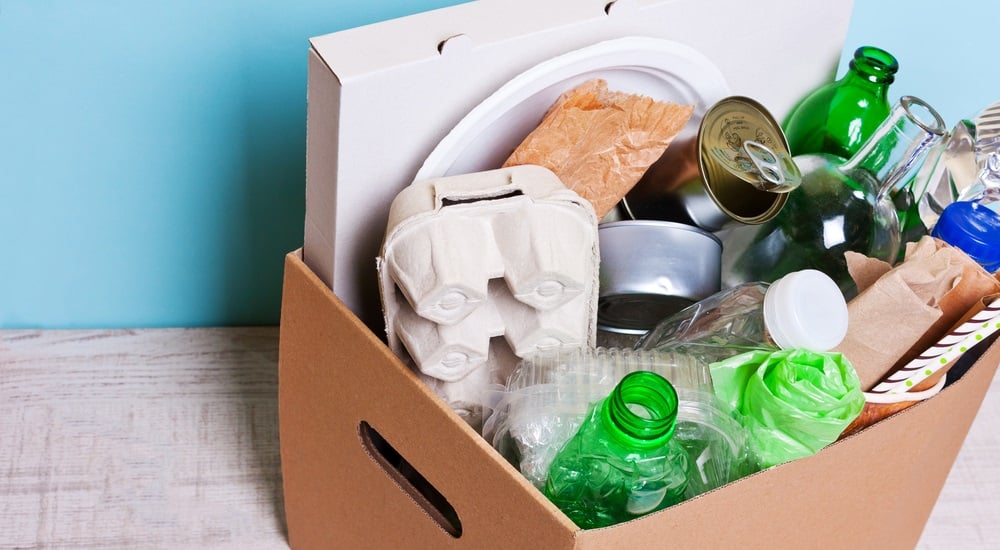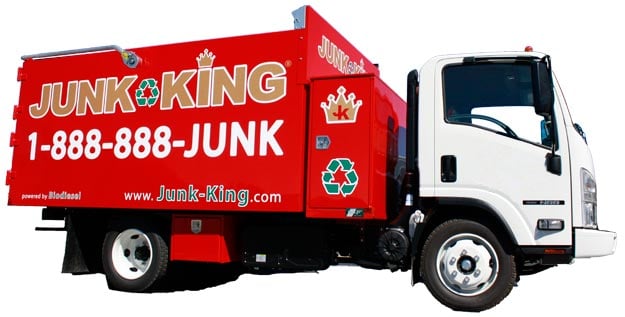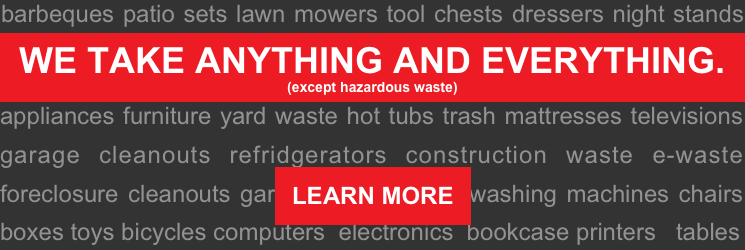
[This article was first published in December 2018 and has been updated and revised.]
If you've been recycling at home you're familiar with the plastic, paper, glass and metal categories. But there's more you can recycle from your home.
In fact, there is so much more that we routinely dispose of from our homes and offices that do not need to go into the trash and, ultimately, into our landfills.
Recycling: We All Do It Now - But That Wasn't Always So
For most Americans, recycling has become an accepted and common practice. And, for those born within the last 20 years or so, it always has been. However, while recycling has been around for centuries, it wasn’t that common in America before the late 1990s.
In fact, most Americans over 40 may remember when recycling was a novel practice that was part of the emerging green movement and the Save the Planet initiatives. For most of us, that all began to change beginning in the 1970s.
However, recycling at home goes back a bit further.
It turns out that, for most folks at home in the United States, the recycling movement in the began during World War II when people began recycling nylons, tin cans, cooking fats, and even the tin in toothpaste tubes for the war effort.
By the late 20th century, many cities began separating reusable trash from garbage designated for a landfill. During the 1960s, the first recycling programs resulting from people’s concern for the environment started were formed. And it seems that the first recycling mill was built in 1974 in Conshohocken, Pennsylvania.
And it was from about that time - the mid-70s - that recycling as we know it today really began to take off.
The (Short) and Growing History of Recycling
Here is a brief overview of residential recycling in the United States:
- In 1974 Missouri used the first curbside-recycling bin for collecting paper.
- Massachusetts started weekly multi-material curbside collection programs in two cities in 1976 using the first residential recycling vehicle.
- By 1980, there were about 220 curbside collection programs in the country.
- In 1985 only 10 percent of Americans were participating in recycling.
- 1985 also had the state of New Jersey passing the first mandatory recycling law that required residents to separate recyclables from their trash.
- By 1995, about 20 percent of Americans were actively recycling with 30 percent by 1998.
- The early 2000s saw curbside collection for organic waste starting up in San Francisco.
- And, in California in 2011, lawmakers set the goal of increasing the state’s recycling rate to 75 percent by 2020.
- By 2018, almost every location in America has recycling curbside bins and most of us regularly must separate our trash for recycling. In fact, for most of us this has become a normal facet of life.15
More recently, we've been doing admirably as a nation when it comes to recycling. According to a recent report by the Environmental Protection Agency (EPA), the overall recycling rate for the United States in 2020 was 32.1 percent.
The EPA also stated on their website that,
"At the 2020 America Recycles Summit on November 17, 2020, EPA announced the overall national recycling goal of increasing the U.S. recycling rate to 50% by 2030. This national goal will provide the benchmark to evaluate the success of the collective efforts to improve the nation’s recycling system. "
Today, most homes have both a trash bin and a recycling bin provided by their municipal waste management service. In fact, some have three bins - two for different types of recyclables.
And in a few states such as California, residents have been required to recycle organic waste since January 1st, 2022. A recent law there mandates that Californians toss all organic material into bins they use for other “green” waste, such as garden trimmings, lawn clippings and leaves.
Recycling at Home – It’s More Than Paper, Plastic, Glass and Cans
While we may be accustomed to recycling on a regular basis, many of us may not realize there are wide variety of other household items can be recycled, as well. This is unfortunate since too many of us simply think that if something is large or not a can or a bottle, it must either go in the trash or off to the dump.
But that’s far from the truth!
And, with landfills becoming scarcer and increasing limitations on what can and cannot be disposed of, the occasional dump run may not be a real option anyway. Besides, if an item can be recycled then it makes no sense to opt for leaving it in a landfill to take up space and deprive the recycling stream of much needed materials.
You might be surprised the next time you have a major clean-out, or after your next spring cleaning, how much of the “junk” you are getting rid of can be recycled. If not the entire item, at least major portions of the components can be.
For example, did you know that you can recycle appliances at any recycle center that is equipped for them? That’s right! And pretty much all your old electronics contain significant amounts of materials in them that can recycled or reused. These unwanted electronic items are what are known as e-waste, or electronic waste.
And there’s more!
Here’s a handy infographic that lists the top five household items that can be recycled instead of taken away to a landfill:

Large appliances are often referred to as "white goods" in the industry. These include refrigerators, freezers, washing machines, tumble driers, dishwashers, and air conditioners. They are typically all the large electrical goods for the house which were traditionally available only in white.
And, as we've noted here, they are largely recyclable.
For example, according to the EPA, around 9 million refrigerator/freezer units are thrown out in the U.S. every year. And around 90 percent of those refrigerators will end up in some type of recycling program.
Got Large Junk? What To Do With It
Unfortunately, because of the costs associated with dumping large household items, many of them end up being abandoned on the side of a road or in a vacant lot. It’s not uncommon to see sofas, mattresses, old microwaves or even washing machines that have been surreptitiously dumped during the night.
And, of course, this is never a good idea. Not only is it unsightly, but it can be a potential hazard not to mention illegal in most places. Yes, taking old stove or refrigerator to the dump can be costly. And, in many places, it’s likely that you might not be able to dump your old appliances there.
So, what can you do with your large items?
If you find yourself with an old item that is usable or that still works, you can try selling it online with sites like Craigslist and eBay. In addition, you can try to sell it to a friend or neighbor, or maybe in a yard sale.
Another option is to donate that unwanted item.
Donating your used furniture, tools and appliances can be a great option to selling them or dumping them. There are many organizations that will pick them up for you and you can often use the donation towards a tax write off.
However, if you don’t want to take the time and effort to sell or donate your large items, then you’re in luck! If you simply want to get rid of an old appliance or other large item, there are businesses that will pick them up from you and then dismantle them for the usable parts and recyclable materials.
Hiring a Professional Junk Hauling Team for Recycling Made Easy
The easiest option is to hire a professional team from Junk King to take care of it all for you. We provide professional junk hauling services for removing refrigerators, freezers, ovens, stoves, flattops, dishwashers, ranges and more.
We have all the equipment and man power to remove a large refrigerator up a small stairway or down your basement steps out through the garage. We can remove commercial appliances if you are renovating a restaurant or upgrading your old equipment.
Junk King will remove any household appliance that you deem unfit. Whether the appliance is broken, or you just want to upgrade your equipment, Junk King can help you get it out of the way. We provide an eco-friendly appliance removal service to help you get rid of any unwanted washers and dryers, or any heating and cooling equipment.
Our professional and insured appliance disposal team will show up at your home or office and we call 15 to 30 minutes before we arrive on site. Not only that, but we’ll give you a free estimate based on how much room your items take up in our truck.
You just point, and we haul your old appliances into our junk removal trucks, with no hidden fees.
And it’s as simple as 1, 2, 3...
You can make an appointment by booking online above or by calling 1.888.888.JUNK (5865).







